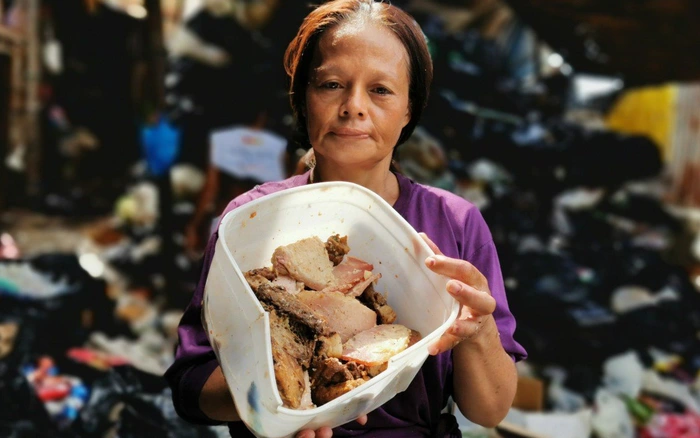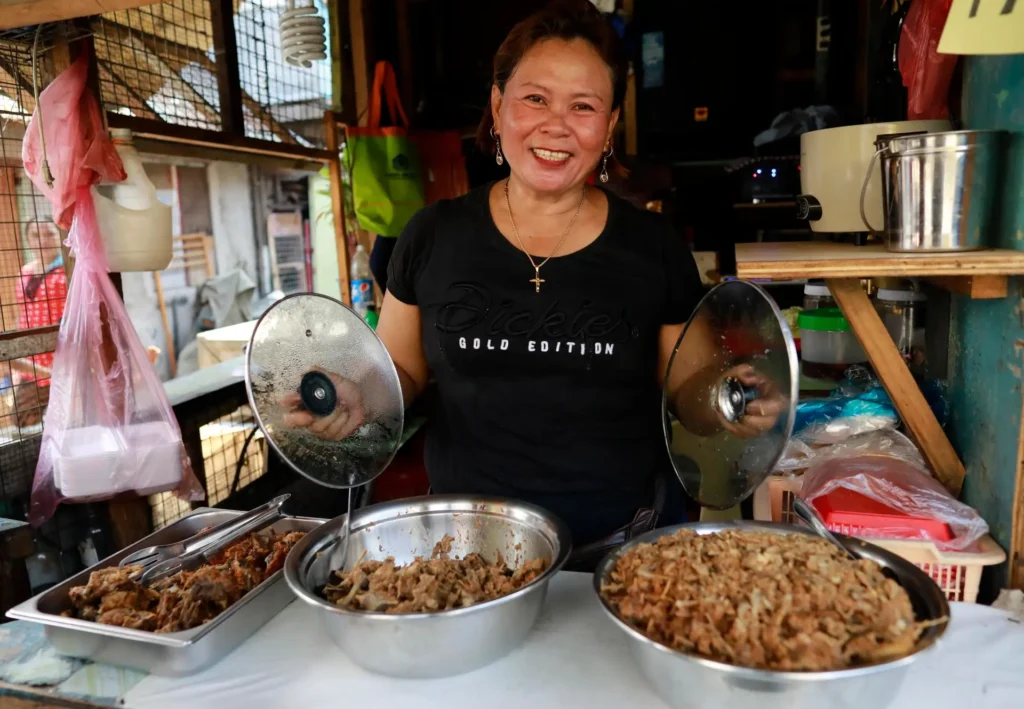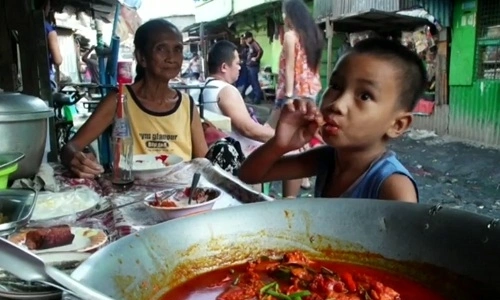[Reading level: B2 – Upper Intermediate]
People often say, “One person’s trash is another person’s treasure,” and in the narrow alleys of Manila, that saying is most clearly reflected in the life of Felipa Fabon — a woman in her fifties who has chosen pagpag as her livelihood amid hardship. Every night, when fast-food restaurants close, she quietly slips behind various garbage bins, beside the prowling stray cats, to look for leftover pieces of fried chicken — crispy skin, scraps of meat — and pick them up. For Felipa, this is not trash, but ingredients to continue the “cycle of life.”

“I am rummaging through this pile of garbage to collect pagpag” — as it is called in Tagalog — “when people throw away pieces of chicken they didn’t finish,” she said.
She often pays about one dollar to professional scavengers to find leftover food during the night, then bring it back to her makeshift home in the Tondo slum. That night, under the flickering streetlights, Felipa carefully shook off the dirt, rinsed the food with water, then cooked the remaining pieces of meat again. Early the next morning, she packed them into small plastic bags and called out, “Pagpag here!” from her doorway.

One of her regular customers is Morena Sumanda — a mother of two who lives in a ramshackle hut built on a massive garbage dump on the outskirts. When money isn’t enough to buy fresh food, Morena has to wait until her husband comes home with five cents before she can afford a bag of pagpag.
She takes the bag of chicken home, washes it again, fries it until golden, and adds a few vegetables — then reassures her small child, saying, “This is your meal today.” Even though she knows this food may contain bacteria, to her, “having something to put in the stomach is better than going hungry.”
The story of Felipa and Morena is not unusual — it mirrors the lives of thousands of poor people in Manila, where pagpag has become an underground survival network. Leftover food is passed on from trash bins, and Felipa and others like her turn it into cheap meals to sell. Even at very low prices — sometimes only five cents for a small bag of bones with little meat — pagpag is always in demand because “it’s cheap and at least people have something to eat.”

Of course, the dish cannot escape health concerns. According to health experts and charitable organizations in the Philippines, even when cooked again, pagpag still contains pathogens, parasites, and bacteria that cause intestinal diseases.
At a school run by the Philippine Community Fund in the Tondo slum, health officers once remarked that students suffered from all kinds of illnesses when they first enrolled — clear signs of the long-term consequences of consuming unsafe recycled food.
Looking at the bags of pagpag Felipa carries out each morning, one can see both resilience and the deep pain of an unjust society: on one side are glittering shopping malls, and on the other are people starving, searching for scraps to survive. Pagpag is a poignant reminder that economic progress only has true meaning when no one is left behind — and that the right to eat safe food should be a basic right for everyone.
WORD BANK:
narrow alley /ˈnæroʊ ˈæli/ (n): con hẻm nhỏ
saying /ˈseɪ.ɪŋ/ (n): câu nói
reflect sth /rɪˈflekt/ (v): phản chiếu, phản ánh cái gì
livelihood /ˈlaɪv.li.hʊd/ (n): kế sinh nhai
amid sth /əˈmɪd/ (prep): giữa, trong bối cảnh gì đó
hardship /ˈhɑːrd.ʃɪp/ (n): khó khăn, gian khổ
slip behind sth /slɪp bɪˈhaɪnd/ (v): lẻn ra phía sau cái gì
prowl /praʊl/ (v): rình rập, đi lang thang săn mồi
stray cats /streɪ kæts/ (n): mèo hoang
leftover /ˈleftˌoʊ.vɚ/ (adj/n): thừa, đồ ăn thừa
crispy /ˈkrɪs.pi/ (adj): giòn
scrap /skræp/ (n): mẩu vụn, phế liệu
scraps of sth /skræps/ (n): những mẩu nhỏ của cái gì
ingredient /ɪnˈɡriː.di.ənt/ (n): nguyên liệu, thành phần
rummage /ˈrʌm.ɪdʒ/ (v): lục lọi, bới tìm
scavenger /ˈskæv.ɪn.dʒɚ/ (n): kẻ ăn xác thối, người nhặt rác
makeshift /ˈmeɪk.ʃɪft/ (adj): tạm bợ
slum /slʌm/ (n): khu ổ chuột
flickering /ˈflɪk.ər.ɪŋ/ (adj): chập chờn, lập lòe (ánh sáng)
shake off /ʃeɪk ɔːf/ (v): giũ sạch, loại bỏ
rinse /rɪns/ (v): rửa qua, tráng qua nước
ramshackle /ˈræmˌʃæk.əl/ (adj): xiêu vẹo, ọp ẹp
hut /hʌt/ (n): túp lều
reassure sb /ˌriː.əˈʃʊr/ (v): trấn an ai đó
bacteria /bækˈtɪr.i.ə/ (n): vi khuẩn
mirror sth /ˈmɪr.ɚ/ (v): phản chiếu, phản ánh cái gì
survival network /sɚˈvaɪ.vəl ˈnet.wɝːk/ (n): mạng lưới sinh tồn
pass on /pæs ɑːn/ (v): truyền lại, chuyển tiếp
in demand /ɪn dɪˈmænd/ (adj): được ưa chuộng, có nhu cầu cao
charitable organization /ˈtʃer.ə.t̬ə.bəl ˌɔːr.ɡən.əˈzeɪ.ʃən/ (n): tổ chức từ thiện
pathogen /ˈpæθ.ə.dʒən/ (n): mầm bệnh
parasite /ˈper.ə.saɪt/ (n): ký sinh trùng
intestinal /ɪnˈtes.tɪn.əl/ (adj): thuộc đường ruột
enroll /ɪnˈroʊl/ [B2] (v): ghi danh, nhập học
resilience /rɪˈzɪl.jəns/ (n): khả năng phục hồi, sự kiên cường
deep pain /diːp peɪn/ (n): nỗi đau sâu thẳm
unjust /ʌnˈdʒʌst/ (adj): bất công
glittering /ˈɡlɪt̬.ɚ.ɪŋ/ (adj): lộng lẫy, lấp lánh
starving /ˈstɑːr.vɪŋ/ (adj): đói lả
poignant /ˈpɔɪn.jənt/ (adj): chua xót, thấm thía
ỦNG HỘ READ TO LEAD!
Chào bạn! Có thể bạn chưa biết, Read to Lead là một trang giáo dục phi lợi nhuận với mục đích góp phần phát triển cộng đồng người học tiếng Anh tại Việt Nam. Chúng tôi không yêu cầu người đọc phải trả bất kỳ chi phí nào để sử dụng các sản phẩm của mình để mọi người đều có cơ hội học tập tốt hơn. Tuy nhiên, nếu bạn có thể, chúng tôi mong nhận được sự hỗ trợ tài chính từ bạn để duy trì hoạt động của trang và phát triển các sản phẩm mới.
Bạn có thể ủng hộ chúng tôi qua 1 trong 2 cách dưới đây.
– Cách 1: Chuyển tiền qua tài khoản Momo.
Số điện thoại 0947.886.865 (Chủ tài khoản: Nguyễn Tiến Trung)
Nội dung chuyển tiền: Ủng hộ Read to Lead
hoặc
– Cách 2: Chuyển tiền qua tài khoản ngân hàng.
Ngân hàng VIB chi nhánh Hải Phòng
Số tài khoản: 012704060048394 (Chủ tài khoản: Nguyễn Tiến Trung)
Nội dung chuyển tiền: Ủng hộ Read to Lead
Lớp luyện thi IELTS online
Bạn đang có nhu cầu thi chứng chỉ IELTS cho đầu vào đại học, đi du học, xin việc hay xin cư trú và đang phân vân chưa biết học ở đâu?
Nếu bạn đang tìm kiếm dịch vụ luyện thi IELTS online với giáo viên uy tín và chất lượng, cũng như học phí phải chăng, thì thầy Trung và Cô Thủy (Admin và dịch giả chính của Read to Lead) có thể là một lựa chọn phù hợp dành cho bạn.
Hãy liên hệ (nhắn tin) tới trang Facebook cá nhân của mình (https://www.facebook.com/nguyen.trung.509) để tìm hiểu về lớp học và được tư vấn cũng như được học thử nha!





